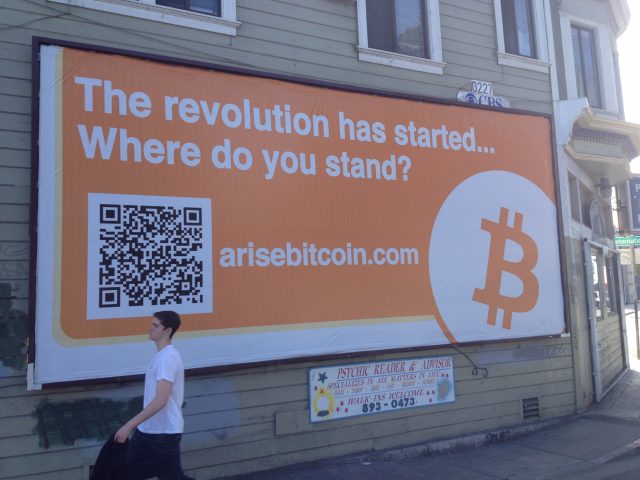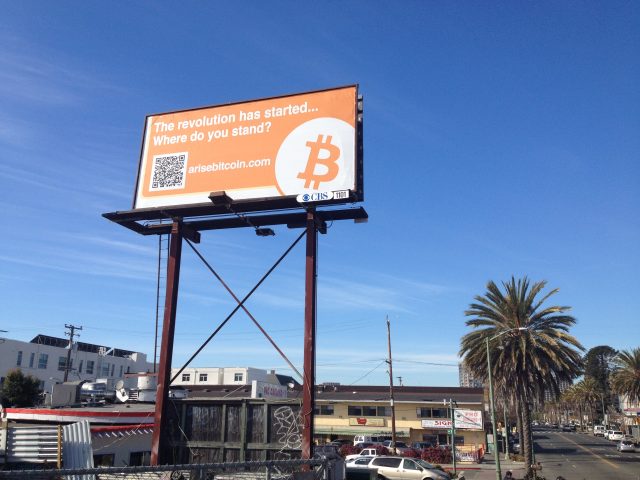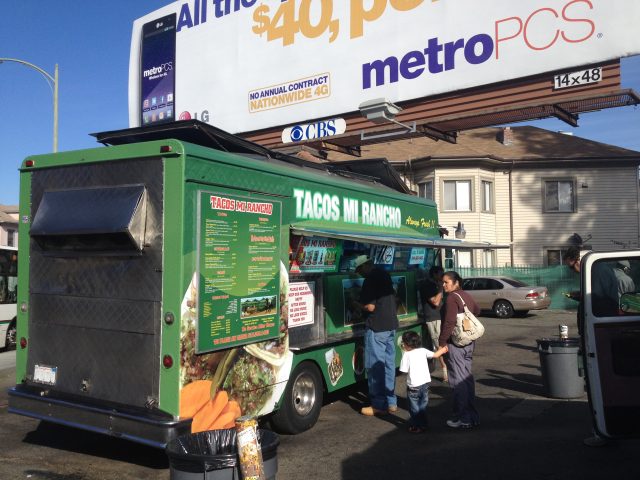
OAKLAND, CALIFORNIA—For the last month, 40 mysterious billboards have popped up in seemingly random locations around the San Francisco Bay Area.
“The revolution has started… Where do you stand?” they read. They’re accompanied by a Bitcoin logo, a QR code, and the URL: arisebitcoin.com.
That URL directs to a sparse website that has little information about its creators. It offers more information about Bitcoin and includes links to trybtc.com and other sites. But people who land on the site won't find a clear product being hawked beyond the nebulous cryptocurrency that anyone can mine.
So what is the point of these billboards? “What we’re trying to do is help promote Bitcoin,” David Miller told Ars.
He’s one of the four co-founders of the project. Professionally, he is an infrastructure manager for Weltman, Weinberg & Reis, a law firm in Cleveland, Ohio.
“There’s four of us,” he added. “We’ve been fans of bitcoins for a couple of years. We’re trying to create a public awareness campaign. To create a bridge between the general public and the miners. They may have heard it in passing or they may have no idea what it is.”
As proof, Miller cited a Bloomberg survey from December 2013, showing that 42 percent of respondents correctly identified it as a “virtual currency,” while 46 percent were unsure and six percent thought Bitcoin was an XBox game, and six percent thought it was an iPhone app.
"We’re not telling people to buy Bitcoin"
Beyond the somewhat murky messaging, placement of the signs has elicited strong reactions from both the tech and non-tech communities in the Bay Area, and as it stands, tensions between the two communities have been high.
“Eww. They sullied the Inner Sunset with this neo-libertarian techie garbage 'Arisebitcoin.' Spare me,” wrote Omar Masry on Twitter on January 13, 2014, including a photo of the billboard on Judah and 9th Street in San Francisco.
“I actually saw a #Bitcoin billboard today, near the @dotpunto rehearsal space. Laughed my goat-ass off. https://arisebitcoin.com,” tweeted Chris Palmer on January 4, 2014.
@cryptogeeks, for its part, applauded the billboards: “Bitcoin: Instantly made my walk to work better: arisebitcoin at Columbus and Broadway in SF.”
Although the wealthier parts of the Bay Area—particularly in downtown San Francisco and Highway 101, which leads to Silicon Valley—are often awash in the billboards of the tech world, signs belonging to Arisebitcoin have popped up in notably non-techie areas. That includes neighborhoods in East and West Oakland, which are among the city's poorest. Other locations include Vallejo, at the far north end of the Bay Area. (The full list of billboard locations is here.) One sign is posted adjacent to a popular taco truck at the south side of Oakland’s Lake Merritt. The billboards will stay up until January 27, 2014.
Miller said that he and the other three organizers put up $10,000 of their own money and partnered with CBS Outdoors, which finds locations that would best maximize its customers' money and then rents out the billboard space. CBS did not immediately respond to Ars’ questions in an attempt to verify Miller’s claims.
“We wanted to try to get as many signs up as we can that were 10 feet by 22 feet,” Miller said. “We weren’t concerned with the overall specific location. We’re not familiar at all with the San Francisco area. [But we knew] that some of [the billboards] are not going to be in the best parts of town. We knew that … regardless of where we put them that we would be able to accomplish our goal.”

“I don’t believe that anybody in this world is excluded from Bitcoin,” Miller added. “We’re not telling people to buy Bitcoin. We just want people to be more aware of what it is. If people see our sign and they’re curious, maybe they’ll spend 10 seconds online and maybe find something interesting that they’d never thought of before. We’re all fans of the movement that is Bitcoin and we want to be part of it as well. It’s kind of hard, especially being in Cleveland, as to what can we do? Right now it’s 100 percent purely isolated to behind a screen and we wanted to project that into the real world.”
Miller said the group was inspired by a guy who held up a huge QR code with the phrase: “Hi Mom, send Bitcoin” at a college football game in late November 2013 and raised over $26,000 from bemused fans on reddit.
Brother, can you spare a bitcoin?
While such a public awareness campaign might seem sort of bizarre, Jerry Brito, a research fellow at George Mason University, says that Bitcoin remains in its infancy.
“There are lots of enthusiasts out there trying different things to spread the good news, but it seems to me that Bitcoin has public awareness built-in,” he said. “If there is demand for cheaper, faster, permissionless payments, then the public will find out.”
But as anyone who has tried to use Bitcoin has figured out, converting between dollars and bitcoins is not always the easiest thing in the world—it can take days using a site like Coinbase to make the purchase. Plus, the cryptocurrency is notoriously volatile and deflationary.

For example, no traditional taco trucks—typically a cash-only business—are going to take bitcoins anytime soon (at least in Oakland). Getting money from customer to merchant, converting in and out of bitcoins, seems far more difficult than is necessary. Brito acknowledged this challenge.
“Totally true, but the PC was incredibly tough for normal people to use when it was first introduced,” he said. “Even the original Mac was not easy, and it did very little. Bitcoin is no doubt experimental, but I think the way to evaluate it is with a longer time horizon than a few months. And it might be another three to four years before it's as widely accepted as Paypal or Visa. Bitcoin is a network technology. Adoption curves slope up slowly for a long time at first then rocket up.”
And what will become of the billboards after the end of January?
Miller told Ars that he’s trying to raise money for “Project Two,” the second phase of the campaign that would put up similar billboards in the New York City area. But this time, he said, they’re relying on money donated from other Bitcoin fans.
“If the community doesn’t want us, then we’ll go away!” he said.
reader comments
97